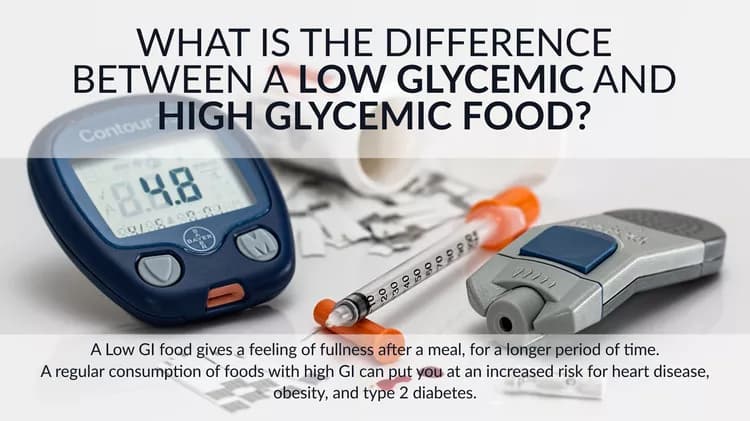
What Is The Difference Between A Low Glycemic And High Glycemic Food?
The Glycemic Index (GI) is a measurement scale for carbohydrate-containing foods that raise blood glucose levels. The higher a food’s glycemic index, the more it will affect your insulin (blood sugar) levels. Thus, using the GI value, carbohydrates can be incorporated and regulated in one’s diet, both quantitatively and qualitatively. This is especially important for diabetics who must monitor their glycemic index so as to maintain proper blood glucose levels.
The glycemic index gives information on how each food independently affects blood glucose levels. A high GI rating means that such foods cause the blood sugar (glucose) levels to increase rapidly in the body, as they are broken down and digested much quicker than medium and low GI rated foods. Foods with low GI rating cause a slow to gradual rise in blood sugar levels, since such foods are broken down and digested slowly. A Low GI food gives a feeling of fullness after a meal, for a longer period of time.
White rice, rice cakes, white bread, popcorn, bran flakes, pretzels, pineapples and melons, and all sugary foods are classified as high GI value foods, while most fruits, non-starchy vegetables (including carrots), peas, pasta, oatmeal, pulses, and whole grains are low GI value foods. However, some foods that include brown rice (or basmati rice), whole wheat, and rye breads are designated as medium GI foods. The Sydney University Glycemic Index Research Services in Australia maintains an international database on GI foods.
The glycemic index values are provided below:
- Low GI values: 1-55
- Medium GI values: 56-69
- High GI values: 70 or more
According to the Harvard School of Public Health, regular consumption of foods with high GI can put you at an increased risk for heart disease, obesity, and type 2 diabetes, since they may keep the blood sugar levels constantly elevated. There also seems to be an association of conditions, such as macular degeneration, infertility, and colon cancer, with high GI diets. Harvard also informs that low GI foods can also help enhance weight loss, control type 2 diabetes, and provide anti-inflammatory health benefits.
Even though the GI rating system is important, it only provides information on how what one eats affects sugar levels in the blood. All foods lower on the GI rating system are not necessarily healthy and all foods scored higher on the GI scale unhealthy. What must also be considered is that even though the raw ingredients that go into a meal may have a low GI, when they are processed and cooked, such prepared food items may climb to higher GI values. Moreover, the GI rating system does not consider the quantity consumed and neither is it an indicator of its nutritional value. For example, having just a slice of pineapple (a high GI food) is different from having a typical serving of pineapple.
Hence, it is not wise to use the glycemic index alone to decide on the components of a well-balanced meal, though the GI could serve as a guide for meal planning. It is also important to note that foods containing carbohydrates influence glucose levels in blood much more than GI values per se. This is an important factor for people with diabetes. In order to have a well-balanced, nutritious meal and regulate blood glucose levels, it is always advised to mix high, medium, and low GI foods.
Related Articles
Test Your Knowledge
Asked by users
Related Centers
Related Specialties
Related Physicians
Related Procedures
Related Resources
Join DoveHubs
and connect with fellow professionals

0 Comments
Please log in to post a comment.